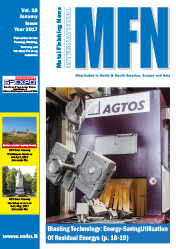E-Archive
Standards Forum
in Vol. 18 - January Issue - Year 2017
AS/EN9100 Transition Strategies

Paul Huyton
The autumn of 2016 has witnessed the publication of newly revised AS9100 family of standards. The principal standards in general use are:
• AS9100 Quality Management Systems - Requirements for Aviation, Space, and Defence Organizations (revision D)
• AS9110 Quality Management Systems – Requirements for Aviation Maintenance Organizations (revision C)
• AS9120 Quality Management Systems – Requirements for Aviation, Space, and Defence Distributors (revision B)
The new standards contain the requirements from ISO9001:2015 plus aerospace regulatory requirements and items of particular stakeholder interest. Using ISO 9001:2015 as the baseline standard means continuing the previous evolution from a production control focus to the broader scope of business management. The standards define the best practice in the management of interrelated processes; anticipating, monitoring and responding to internal performance and the external business environment. Greater flexibility of documentary requirements is being permitted but there is a more explicit requirement for a quality manual, as defined in clause 4.4.2, than in ISO9001.
Key issues which may challenge users of the standards are:
• The change to a ten-clause High Level Structure (HLS) which is in keeping with the ISO standards for Health and Safety and Environmental Management. The commonality with these other standards will facilitate the combining of procedures or documentation, but this is not a requirement. The complexity which may arise from combining with other standards is an issue which each user can decide for themselves. Within this ten-clause structure the standards still can define the sequence of "Plan – Do – Check – Act" which has been the foundation of Quality Management since the mid twentieth century work of William Edwards Deming.
• Understanding the context of the organization and the needs and expectations of all interested parties. This entails determining the issues, external and internal, which effect the organisation and its strategic direction. This must include other organizations or parties which have requirements to be met during the execution of the quality management system.
• The requirement that management can provide evidence of achieving the ten defined attributes of commitment and leadership which can affect the performance of the quality management system.
• Greater use of risk-based thinking (RBT) including use for preventive action. Business threats and opportunities will also be included within this requirement.
• Process approach strengthened with integration of the Quality Management System into the organization’s business processes and objectives.
• More emphasis on the capability to manage change.
• Introduction of knowledge management, addressing knowledge accumulated by experience and changes in knowledge needs and trends.
• More consideration of human factors in non-conformity and corrective action.
There are more supporting standards and guidance to be published by the IAQG (International Aerospace Quality Group) before transition to the new revisions can take place. However, users of the standards should now be determining their strategy to make this transition.
Current plans indicate that the transition training modules for AS9100 auditors should be published in January 2017. This will allow the certifying bodies to develop their auditor training programmes and revise their relevant systems & procedures. Auditors must be trained and qualified so that certifying bodies can receive their accreditation to the new standards.
From June 2017 all audits must be undertaken to the new revision level of the standards, using AS9101:2016 as the audit checklist and guide.
Customers shall soon flow-down the requirement that their suppliers be certified to these latest revisions of the relevant standards. As the certification bodies may not be able to audit to the new requirements for some time, a user may need to agree with customers to a longer-term plan for transition. This does not mean that implementing the new requirements should be delayed and such changes will not be in conflict to the current Quality Management certification. Nothing in the latest revision negates the requirements of the foregoing revision. The new requirements can be implemented and improved upon until certification is possible from the user’s accreditation body.
By September 2018 the transition must be complete for all users as certificates to the previous revision level shall no longer be valid.
The transition to the latest revisions of the AS9100 family of standards shall be challenging, but the rewards shall be a quality system which is more integrated to business strategy and operations, with higher standards of leadership and risk awareness.
For questions contact paul@mfn.li
Standards Forum
by Paul Huyton,
MFN Course Director World Wide
more information at www.mfn.li/trainers



























